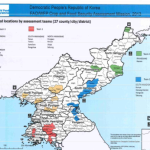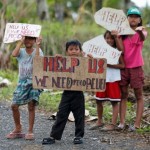- DETERRENCE: U.S. envoy Davies on North Korea policy in Japan
- DPRK: The motivations behind North Korea’s pursuit of simultaneous economic and nuclear development
- ENERGY SECURITY: Can a collapse of global civilization be avoided?
- GOVERNANCE AND CIVIL SOCIETY: Rival party leaders to meet over political standoff
- CLIMATE CHANGE ADAPTATION: Understanding the adaptive capacity of Australian small-to-medium enterprises to climate change and variability
- CLIMATE CHANGE AND SECURITY: Loss and damage is a reality today
 DETERRENCE: U.S. envoy Davies on North Korea policy in Japan, U.S. Department of State (25 November 2013)
DETERRENCE: U.S. envoy Davies on North Korea policy in Japan, U.S. Department of State (25 November 2013)
“The current level of sanctions hasn’t quite persuaded North Korea to think as you suggested. Is it time for a different tactic?…DAVIES: Well, that time will come soon, but we’re not there yet. There’s still room for diplomacy. ..If we do not see signs of North Korean sincerity…then there is more pressure that will be brought to bear on them.”
- The Iran nuclear deal: full text, CNN (24 November 2013)
- A WMD-Free Zone in the Middle East: regional perspectives, Martin Malin and Paolo Foradori, Belfer Center for Science and International Affairs, Harvard Kennedy (1 November 2013) [PDF, 1.5MB]
- Maariv: Arab-Israeli meeting plans WMD free zone in the Middle East, Middle East Monitor, October 31, 2013
 DPRK: The motivations behind North Korea’s pursuit of simultaneous economic and nuclear development, Scott Snyder, Council on Foreign Relations (20 November 2013)
DPRK: The motivations behind North Korea’s pursuit of simultaneous economic and nuclear development, Scott Snyder, Council on Foreign Relations (20 November 2013)
DPRK plans to establish several more Special Economic Zones in DPRK’s interior in addition to the periphery to support its byungjin rosun (병진노선) or simultaneously pursuing economic and nuclear development policy. There is little indication the previously established Special Economic Zones have matured legally, financially or governance-wise. North Korea lacks an economically vibrant diaspora like the one that China drew upon to “bootstrap” its Special Economic Zones.
- Provincial Economic Development Zones to be set up in DPRK, (North) Korean Central News Agency (21 November 2013)
- What should North Korea’s trade pattern look like? Marcus Noland, North Korea: Witness to Transformation, Peterson Institute for International Economics (18 November 2013)
- Democratic People ’s Republic of Korea – Food and Agricultural Organization / World Food Program Crop and Food Security Assessment Mission, November 2013, FAO/WFP, (28 November 2013) [PDF, 3.34 MB]
 ENERGY SECURITY: Can a collapse of global civilization be avoided? Paul R. Ehrlich nad Anne H. Ehrlich, Proceedings of the Royal Society B (Biological Sciences) (9 January 2013)
ENERGY SECURITY: Can a collapse of global civilization be avoided? Paul R. Ehrlich nad Anne H. Ehrlich, Proceedings of the Royal Society B (Biological Sciences) (9 January 2013)
The end of the world is near, and the time to save it now, as always. Gloom and doom inspire fury of hell fire and brimstone among scientists. Faith in technologists instead inspires Pollyannaish fantasies of heaven at hand. Humans have a weakness for fright and faith, so they take bets; on whose money and lives is the question. Paul Ehrlich and the late Julian Simon took “The Bet” in 1980, subject of a new book. The preacher of ‘60s California “argued in favor of a “relaxed lifestyle, good friends, and a happy sex life” and coercive fertility repression. This was after being stuck in Delhi traffic then. It’s time to humanize, not just monetize, sustainability.
- Ehrlich & Ehrlich: Can a global collapse of civilization be avoided? Judith Curry on her blog (with responses from Michael Kelly and hundreds of comments) Judithcurry.com (2 August 2013)
- The battle of two hedgehogs, Cass R. Sunstein, review of Paul Sabin’s The Bet: Paul Ehrlich, Julian Simon, and Our Gamble Over Earth’s Future, New York Review of Books (5 December 2013)
- People who breed people, Christopher Hitchens, Vanity Fair (July 2000)
 GOVERNANCE AND CIVIL SOCIETY: Rival party leaders to meet over political standoff, Yonhap (2 December 2013)
GOVERNANCE AND CIVIL SOCIETY: Rival party leaders to meet over political standoff, Yonhap (2 December 2013)
Deadlock between the ruling and opposition parties in the ROK government has prevented the passing of several key bills, as the opposition party is boycotting all parliamentary proceedings amid an ongoing investigation into the role the national spy agency played in last year’s presidential election. Several religious organizations have called for the President’s resignation and protest the government’s labeling a priest as pro-DPRK in response.
- Prosecutors detail attempts to sway South Korean election, Choe Sang-hyun, New York Times (21 November 2013)
- Religious organizations turn up pressure seeking Pres. Park’s resignation, Cho Yeon-hyun, Hankyoreh (28 November 2013)
- Political parties at odds over Catholic mass calling for president’s resignation, Yonhap (23 November 2013)
 CLIMATE CHANGE ADAPTATION: Understanding the adaptive capacity of Australian small-to-medium enterprises to climate change and variability, Natasha Kuruppu et al., University of Technology-Sydney and National Climate Change Adaptation Research Facility (2013) [PDF, 2.0 MB]
CLIMATE CHANGE ADAPTATION: Understanding the adaptive capacity of Australian small-to-medium enterprises to climate change and variability, Natasha Kuruppu et al., University of Technology-Sydney and National Climate Change Adaptation Research Facility (2013) [PDF, 2.0 MB]
Various actions are imperative to increase the adaptive capacity of Australian small-to-medium enterprises (SMEs). These actions include: the social connections between SMEs and related organisations; the agency of SMEs to put resources on the way to build resilience into the business operations; SMEs’ sensitivity about climate risks; and power struggles between SMEs and related organisations.
- Key statistics: Australian small business, Department of Innovation, Industry, Science and Research, Commonwealth of Australia (2011) [7.30 MB, PDF]
- Climate change – the sustainable business opportunity beyond the risk, Sustainability4SMEs (2013)
 CLIMATE CHANGE AND SECURITY: Loss and damage is a reality today, Kees van der Geest and Koko Warner, UN University, Thomson Reuters Foundation (20 November 2013)
CLIMATE CHANGE AND SECURITY: Loss and damage is a reality today, Kees van der Geest and Koko Warner, UN University, Thomson Reuters Foundation (20 November 2013)
What do people do to deal with climate change impacts, and what happens when all they do is not enough? Loss and damage is already a significant consequence of inadequate mitigation of, and adaptation to, climatic changes across the world. This research in 9 countries tells of ‘just getting by’, suggesting that at some scales and in some regions human societies already exist precariously between the borders of ‘safe’ and ‘unsafe’ operating spaces at the adaptation frontier.
- Loss and damage from climate change: local-level evidence from nine vulnerable countries, Koko Warner and Kees van der Geest, International Journal of Global Warming, Special Issue on Loss and Damage from Climate Change, Vol. 5 No. 4 (2013)
- Introduction: human security in the age of carbon, Michael R. Redclift and Marco Grasso, in Handbook on Climate Change and Human Security, Michael R. Redclift and Marco Grasso (eds.) Edward Elgar (31 October 2013)
- Global environmental change and human security, Karen O’Brien and Jon Barnett, Annual Review Environmental Resources, Vol 38: 373-391 (October 2013)
The Nautilus Peace and Security Weekly Report presents articles and full length reports each week in six categories: Austral security, nuclear deterrence, energy security, climate change and security, the DPRK, climate change adaptation and governance and civil society. Our team of contributors carefully select items that highlight the links between these themes and the three regions in which our offices are found—North America, Northeast Asia, and the Austral-Asia region.
Subscribe to NAPSNet to receive free weekly email reports
Editor
Contributors
- Deterrence: Peter Hayes
- Governance and Civil Society: Dyana Mardon
- Climate Change Adaptation: Saleem Janjua
- DPRK: Roger Cavazos
- Energy Security: Nikhil Desai
- Climate change and Security: Richard Tanter

